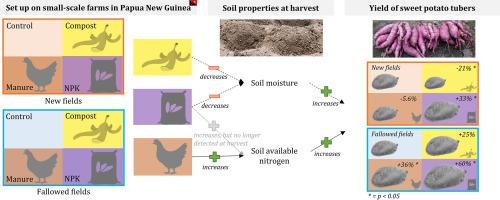Agricultural Systems ( IF 6.1 ) Pub Date : 2021-06-04 , DOI: 10.1016/j.agsy.2021.103089 Mirjam Hazenbosch , Shen Sui , Brus Isua , Emilie Beauchamp , Jan Frouz , Kiole Imale , Mavis Jimbudo , E.J. Milner-Gulland , Vojtěch Novotný , Hana Veselá , Rebecca J. Morris

|
Context
Swidden agriculture (a type of small-scale agriculture) is crucial to the livelihood and food security of millions of people in tropical regions. Social-ecological changes, including population growth and anti-swidden policies, are putting pressure on the existing swidden system to increase agricultural productivity in a sustainable way. Enhancing soil fertility is a promising option for increasing crop yields and extending lifetimes of agricultural fields, thereby reducing the demand to clear new land. However, there is limited information on how swidden farmers can best maintain soil fertility.
Objective
Our aim was to investigate whether using locally available fertilisers can increase soil quality, crop yields and lifetimes of swidden fields.
Methods
We established experimental gardens on the land of swidden farmers in the Lowlands of Papua New Guinea, where the majority of the population depends on swidden agriculture. Gardens were set up on two types of sites; five were established on new sites that had just been prepared for gardening by cutting and burning vegetation after a fallow period, whereas another five were prepared on garden sites that were just being fallowed. We applied three treatments; i) compost consisting of decaying banana peels, ii) chicken manure, and iii) NPK fertiliser to different plots within each garden; and tracked soil quality and yields of sweet potato over 12 months (three post-intervention cropping periods). We also conducted in-depth interviews with local farmers to understand their perspective on soil management.
Results and conclusions
Few farmers typically used compost, chicken manure or NPK fertiliser. Many were keen to try these fertilisers, provided they had more information. The performance of treatments depended on the type of garden with chicken manure increasing tuber yields in fallowed gardens but not new gardens, and banana peel compost also increasing tuber yields in fallowed gardens although not significantly. NPK fertiliser was the best option because it was the only fertiliser that increased yields in both new and fallowed gardens, produced tubers of similar quality and taste to control plots and was financially profitable. Treatments affected yield through increasing available nitrogen and reducing soil moisture. We also found that farmers fallow their gardens despite adequate sweet potato yields, so whether using fertilisers can enhance the lifetime of fields will depend on additional factors such as labour input needed.
Significance
Our work shows how swidden agriculture can potentially be adapted so that it continues to be a sustainable way of farming and living.
中文翻译:

使用当地可用的肥料来提高巴布亚新几内亚农民的产量
语境
转耕农业(一种小规模农业)对热带地区数百万人的生计和粮食安全至关重要。社会生态变化,包括人口增长和反瑞典政策,正在对现有的瑞典系统施加压力,以可持续的方式提高农业生产力。提高土壤肥力是增加作物产量和延长农田寿命的有希望的选择,从而减少清理新土地的需求。然而,关于转地农民如何最好地保持土壤肥力的信息有限。
客观的
我们的目的是调查使用当地可用的肥料是否可以提高土壤质量、作物产量和荒地的寿命。
方法
我们在巴布亚新几内亚低地的农夫土地上建立了实验花园,那里的大多数人口都以农耕为生。花园建在两种类型的场地上;五个是在休耕期后通过砍伐和焚烧植被刚刚准备用于园艺的新场地上建立的,而另外五个是在刚刚休耕的花园场地上准备的。我们应用了三种处理方法;i) 由腐烂的香蕉皮组成的堆肥,ii) 鸡粪,和 iii) 每个花园内不同地块的 NPK 肥料;并跟踪了 12 个月(干预后的三个种植期)的土壤质量和甘薯产量。我们还与当地农民进行了深入访谈,了解他们对土壤管理的看法。
结果和结论
很少有农民通常使用堆肥、鸡粪或 NPK 肥料。许多人热衷于尝试这些肥料,只要他们有更多的信息。处理的效果取决于花园的类型,鸡粪增加了休耕花园的块茎产量,但不是新花园,香蕉皮堆肥也增加了休耕花园的块茎产量,但不显着。NPK 肥料是最好的选择,因为它是唯一可以提高新花园和休耕花园的产量、生产质量和口味相似的块茎以控制地块并且在经济上有利可图的肥料。处理通过增加可用氮和降低土壤水分来影响产量。我们还发现,尽管甘薯产量充足,农民仍然休耕他们的花园,
意义
我们的工作展示了如何对草本农业进行调整,使其继续成为一种可持续的农业和生活方式。











































 京公网安备 11010802027423号
京公网安备 11010802027423号